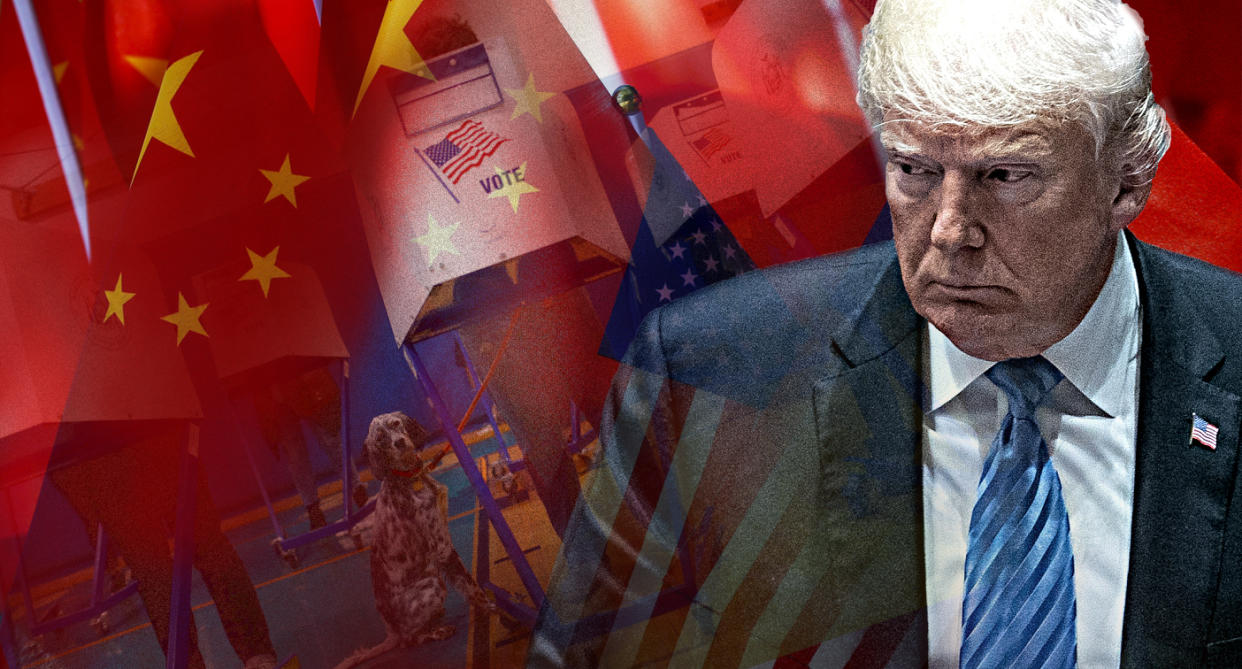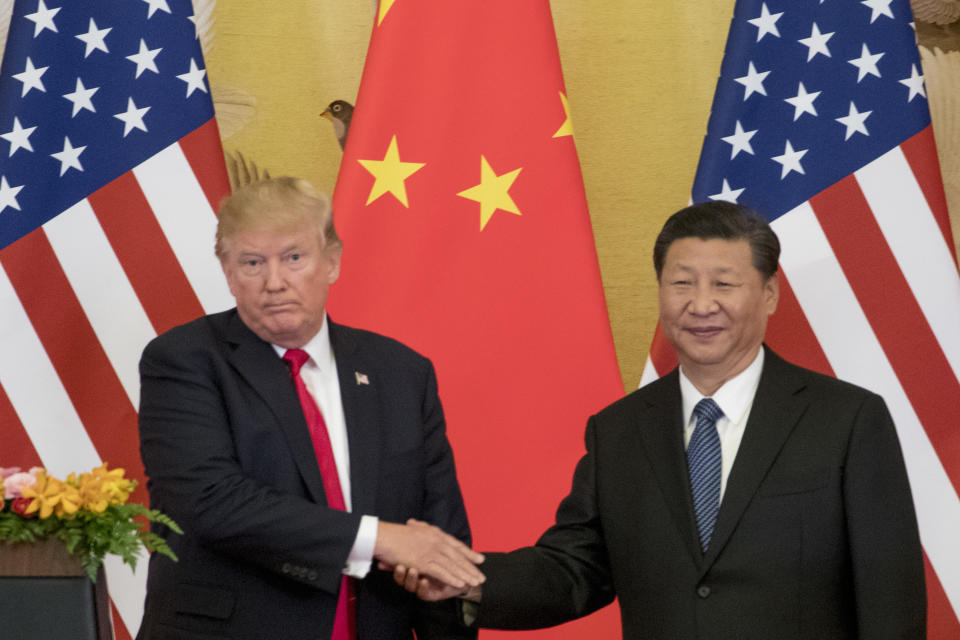With Democrats in control of House, Trump White House may double down on China interference claims

Some six weeks after President Trump accused China of trying to interfere in the midterm elections to hurt Republicans, little public evidence has emerged to support that claim. But now, with the Democrats set to control the House in January, the issue is far from over for the White House, and Beijing’s alleged meddling in American affairs is set to be a major focus for Trump in the weeks and months ahead.
“China’s political interference campaigns are broad and deep,” a senior administration official told Yahoo News, adding that the president would “continue to take actions against foreign interference.”
There are clearly potential political benefits for the Trump administration in raising the specter of Chinese meddling, particularly after an election that didn’t go the White House’s way. But there are also legitimate concerns about Beijing’s activities even if most analysts and experts don’t believe China’s actions rise to the level of an election interference campaign.
Multiple sources in and out of the White House suggested there was some frustration that the president’s past warnings on the issue hadn’t been taken more seriously even though both Trump and Vice President Mike Pence have discussed the threat of Chinese election interference in stark terms.
The sources pointed to a speech Trump gave at the United Nations in September when he accused China of “attempting to interfere in our upcoming 2018 election coming up in November against my administration” as well as an address Vice President Mike Pence made in a major China policy speech at the Washington-based Hudson Institute in October. In Pence’s remarks, he accused Beijing of partaking in “an unprecedented effort to influence American public opinion, the 2018 elections and the environment leading into the 2020 presidential election.”
In the wake of those dramatic speeches, more attention has been paid to Trump’s trade battles with China, which was also discussed in those remarks. However, for many in the president’s orbit, the threat of political meddling from China still looms large.
Trump “went out of his way” to point to Chinese election interference in his U.N. speech, said one former official, who added they were certain China had attempted to sway the 2018 races.
“They probably meddled in 2016 in my opinion,” the former official added, without providing any specifics.
Yet the threat of actual electoral inference, at least publicly, were vague, at best.
According to one Trump adviser, national security officials had been having meetings about possible Chinese meddling in the midterm elections, but declined to discuss it further. “It would be a big deal for the Chinese to know what we know,” the official said.

However, not everyone in the Trump administration is convinced. Three other national security officials said they have seen no evidence of Chinese interference in the midterms.
Trump and Pence’s speeches also didn’t provide much to back up their blockbuster claims, though the vice president’s comments were more detailed. He provided two examples of what he called election meddling — an insert paid for by the Chinese government and published in the Des Moines Register arguing that Trump’s China-related economic policies were bad for Iowa voters, and retaliatory Chinese tariffs targeted specifically at Trump’s base — which analysts have said certainly represent a pressure campaign but don’t seem to amount to electoral interference.
The senior Trump administration official also cited only one specific example, an incident where China’s Communist Party “required Marriott to shut down its Chinese websites and apps for a week after one of their United States-based employees ‘liked’ a tweet on Tibet.”
Still, there is no question the Chinese government has engaged in a sweeping, long-term strategy to influence the leaders and politics of Western democracies, including the United States. Researchers have uncovered efforts to cultivate relationships with campaign donors, business leaders with political sway, academics and community leaders in order to shape public opinion in Beijing’s favor and to shut out dissidents and other critical voices.
There is little public evidence, however, of a broad campaign to interfere in the midterms.
It is reasonable for Trump to be concerned about what is clearly a Chinese government effort to pressure the American electorate, said Jonas Parello-Plesner, a fellow at the Hudson Institute and author of a June report about Chinese Communist Party interference operations in democracies.
The United States is clearly the target of Chinese government efforts at broader political interference, which in contrast to direct election meddling is “much more about securing elites inside democracies that are amenable to a rising China,” he said, complimenting the current administration for drawing attention to the overall issue.
But, he said, “I don’t think we are experiencing specific Chinese election interference.”
The White House included China along with Russia and Iran as the only individual countries to be named when a group of officials held a press briefing call on election security efforts last month. However, in that call, a senior administration official drew a distinction between “influence” efforts and election “interference.” Still, the official noted that “either of those phenomena could result in sanctions” under an executive order to address “foreign interference in a United States election” that President Trump signed in September. Officials believe China’s behavior qualifies as an influence campaign rather than an attack on our electoral systems along the lines of the efforts the intelligence community says have been conducted by Russia.

That executive order also provided a road map for the Trump administration to return to the topic of China’s influence campaign. It called for the director of national intelligence to conduct an assessment within 45 days of any election of “information indicating that a foreign government, or any person acting as an agent of or on behalf of a foreign government, has acted with the intent or purpose of interfering in that election.” A follow-up report was ordered to be delivered to the president.
Abigail Grace, who worked in the National Security Council’s Asia division until earlier this year, wants to see the White House provide detailed public evidence of Chinese election interference before raising the issue. Grace believes a nonpartisan FBI investigation into Chinese interference should be conducted and that any findings should be made publicly available in a declassified report.
“People have a right to ask for the facts to back up the claims that they are making,” Grace told Yahoo News.
Making the case that China interfered with the elections could prove politically advantageous for the president, drawing attention away from the mounting claims that Russia intervened in the 2016 presidential race to help Trump. And Chinese interference could also be used to detract from Democratic gains in the midterms.
Ahead of the Democratic takeover of the House on Tuesday night, the White House turned to a strategy Trump employed in the 2016 presidential campaign — preemptively questioning the validity of the election. Trump raised the specter of “illegal voting” and warned law enforcement to keep a close eye on polling places.
If the White House is unhappy with the results, it may want to make a stronger case for Chinese interference, according to a Trump ally.
“It would make a lot of sense to amplify that message after the election,” the person said.
So far, however, that hasn’t happened, and a Department of Homeland Security briefing on the day of the midterms said there had been no evidence of foreign interference.
Grace, the former White House security official, said she’d hate to see the White House use Chinese election interference regardless of the strength of the evidence that emerges.
“In today’s hyper-polarized environment, it would be a mistake to use Chinese election meddling as a partisan political point… It would cheapen the discussion,” said Grace. “I hope they don’t do that.”
_____
Read more from Yahoo News:
The CIA’s communications suffered a catastrophic compromise. It started in Iran.
Ending the Qatar blockade might be the price Saudi Arabia pays for Khashoggi’s murder
How Robert Mercer’s hedge fund profits from Trump’s hard-line immigration stance
Trump’s target audience for migrant caravan scare tactics: Women


